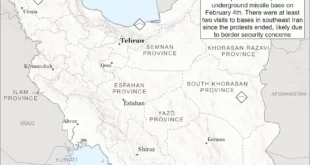 TEHRAN (Fars News Agency)- Iran reached out to Iraq and the American public in separate gestures Wednesday, giving the Baghdad government a $1 billion line of credit while Iranian President Mahmoud Ahmadinejad sent a personal letter to “noble Americans” calling for a military withdrawal from Iraq.
TEHRAN (Fars News Agency)- Iran reached out to Iraq and the American public in separate gestures Wednesday, giving the Baghdad government a $1 billion line of credit while Iranian President Mahmoud Ahmadinejad sent a personal letter to “noble Americans” calling for a military withdrawal from Iraq.
The financial arrangements were revealed on the third and final day of Iraqi President Jalal Talabani’s meetings here with Iran’s political elite. Ahmadinejad made clear that Iran would support Iraq’s government in setting a timetable for U.S. troops to leave the country.
In an interview with the Chicago Tribune in Tehran, Iranian Foreign Minister Manouchehr Mottaki said that in addition to the line of credit, Ahmadinejad and Talabani had signed “hundreds of millions of dollars” worth of no-bid contracts and trade pacts for Iraqi reconstruction. Under the agreements, Iran will help rebuild schools, hospitals, pipelines and power plants.
Iran’s gestures underscored its deep religious bond with its Shiite-majority neighbor but also what some believe is its desire to displace the U.S. as a powerbroker in Iraq. They were announced as possible tensions surfaced in the US-Iraq relationship when a summit between Iraqi Prime Minister Nouri al-Maliki and President Bush in Amman was postponed by a day.
Ahmadinejad’s “letter to the American people,” released by Iran’s UN mission in New York, made special note of the financial cost of the Iraq war to the US.
“I consider it extremely unlikely that you, the American people, consent to the billions of dollars of annual expenditure from your treasury for this military misadventure,” he wrote.
He noted other possible uses for the money, pointing out that “many victims of Katrina continue to suffer, and countless Americans continue to live in poverty and homelessness.”
Ahmadinejad advised Americans to leave Iraq to restore their respect and reputation.
“Based on an agreed timetable with the Iraqi government, trying to handle the affair eventually, you should let the Iraqi government run the country,” he said in his five-page letter to the American nation.
Ahmadinejad had invited Talabani to Tehran this week to explore possible ways to bring calm to Iraq.
Ahmadinejad and Talabani further attended a joint press conference where they responded to reporters’ questions.
Talabani said the two countries “had complete agreement” in three days of talks. Talabani, who has had good relations over the years with both Iranian and US leaders, has been portrayed as pivotal in finding support for Iraq from Iran, a longtime US adversary.
Some analysts had suggested that Talabani could possibly open some avenues of communication between Iran and the United States, but there was no hint of a broader agenda from the Iraqi leader’s comments Wednesday.
“We can clearly say that the trip has been 100 percent successful,” Talabani said. “And I would like to give the Iraqi nation the good news that the fruitful result of this trip will soon be seen by them.”
Talabani met with top ministers in the government and the Supreme Leader of the Islamic Revolution Ayatollah Seyed Ali Khamenei, and he indicated that the Iranian elite are well informed of the threat that the violence has posed to the region.
Ahmadinejad was specific in his statement about how he regarded the daily car bombs and mortar attacks that have nearly paralyzed Iraq and have been blamed largely on feuding Shiite and Sunni Muslim factions.
“Terrorist acts are the most shameful acts you can do,” Ahmadinejad said. “This is not a help to the Iraqi nation.”
Foreign Minister Mottaki, in an hour long interview in his office after the leaders’ briefing, elaborated on how Iran and Iraq had “found common ground” this week.
Iran is intent on supporting the president, prime minister and government of Iraq, he said.
Asked what security measure Iran could provide, he said “anything that is asked of us. They have to ask and they have to announce it.”
Asked whether the leaders discussed Iran’s continuing dispute with the US and the UN over its nuclear enrichment program, Mottaki said no one raised the issue. “We had no communication with Mr. Talabani on the nuclear issue,” he said.
“I think it is time for the United States to take a hard look at their failings in the region,” Mottaki said, adding that Iran was looking for some changes on the ground in Iraq and Afghanistan where American forces are positioned.
“It’s an attitude, not the number of forces,” he said about the Iranian leadership’s ire toward US policy.
Ahmadinejad’s letter to the American public was released just after Wednesday’s press briefing.
The letter asked the American public to “play an instrumental role” in reforming US policy.
 Eurasia Press & News
Eurasia Press & News



